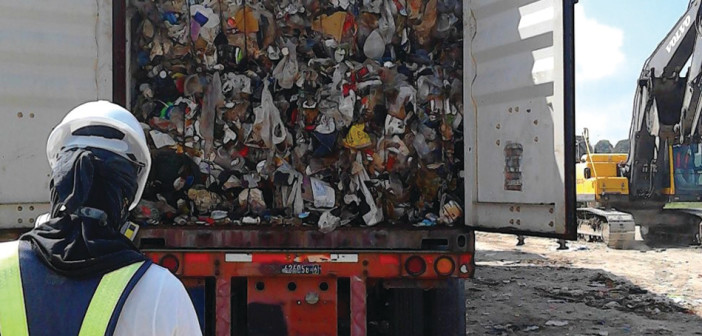The Department of Foreign Affairs (DFA) said on Thursday it would file a diplomatic protest with the Canadian government over the container vans of garbage shipped to the Philippines two years ago.
It asked the Department of Environment and Natural Resources (DENR) and the Bureau of Customs (BOC) to provide it with documents to support the diplomatic protest.
“[We will] underscore the Philippine government’s position on the issue and reiterate our request that the Canadian government take appropriate action,” said Assistant Secretary Charles Jose, the DFA spokesperson, when asked in a news briefing what the diplomatic protest through a note verbale would contain.
The DENR and BOC asked the DFA in a joint letter dated July 27 to file a diplomatic protest with the Canadian Embassy in order to avoid “a repeat of the unfortunate incident and enjoin the government of Canada to revisit their domestic regulations on the export or illegal traffic in waste.”
In a reply on July 29, Jose said the DFA asked for certain “technical” information and documents from the DENR and BOC to back its note verbale to the Canadian Embassy.
“As soon as we receive the information and documents from the DENR and BOC, we will relay a third diplomatic note to the Canadian Embassy,” he said.
Jose disclosed that the DFA had previously sent two diplomatic notes about the waste to the Canadian Embassy.
Asked if the two notes were diplomatic protests, Jose said: “They expressed objection to the shipments.”
In the earlier notes, the Philippines asked the Canadian government to assist with the re-export of the container vans to Canada.
Jose, however, ducked questions on Philippine efforts to raise the waste issue with the secretariat of the Basel Convention on the Control of Transboundary Movements of Hazardous Wastes and Their Disposal, to which both the Philippines and Canada are signatories.
He said any questions on this should be directed to the DENR, which is the “focal point of the convention.”
“If they decide to file a case, we will assist (the DENR). But the decision will come from the DENR,” Jose said.
The DENR had decided to dispose of the waste in a sanitary landfill in Tarlac, pointing out that the trash was residual and municipal solid waste and was not hazardous or toxic.
The Canadian Embassy in a previous statement said Canada had no domestic laws to compel the shipper to take the containers back.
Meanwhile, customs officials on Friday filed smuggling charges against the importer of 48 45-foot container vans filled with garbage from Canada.
Charged in the Department of Justice (DOJ) was Nelson Manio, proprietor of Live Green Enterprises, for the unlawful importation of waste that had been misdeclared as “plastic scraps” from Vancouver, Canada.
The BOC said that under the law, only homogeneous plastic scrap was allowed as a regulated import but with a preshipment importation clearance from the Environmental Management Bureau under the Department of Environment and Natural Resources.
Live Green Enterprise was charged with violating Section 3601 of the Tariff and Customs Code, in relation to the DENR Administrative Order entitled “Interim Guidelines for the Importation of Recyclable Materials Containing Hazardous Substances.”
The BOC discovered the trash, which arrived at the Manila International Container Port, in May after making an inventory of overstaying cargo.
Import documents identified the exporter as Demetrios Jim Makris of Chronic Inc. Canada, the same company that shipped the 55 container vans of heterogeneous waste that arrived in the country last year and were consigned to Chronic Plastics. This caused the BOC to suspect more shipments of trash were coming.
The bureau filed similar charges in the DOJ against the owner and broker of Chronic Plastics in February 2014, which are pending in court.




